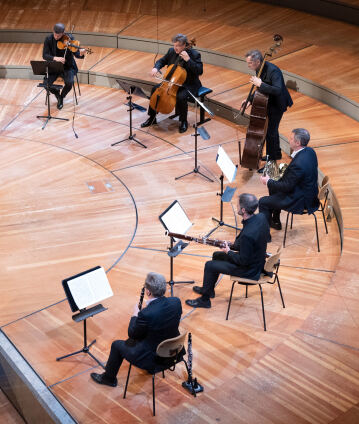The Berlin Phil Series: Philharmonic Octet Berlin

This episode of the Berlin Phil Series brought the familiar, the new and the unknown together in a captivating way. Schubert’s Octet for five strings and three winds, considered the founding work of this instrumental genre of chamber music, was programmed alongside a world premiere by Toshio Hosokawa and an almost forgotten piece for the same formation by Hugo Kaun. All three works were performed by one of the orchestra’s most venerable chamber music formations: the Philharmonic Octet Berlin.
It can be observed from time to time even in the field of music: in his own country, the prophet counts for little. An example of this is the composer Hugo Kaun, born in Berlin in 1863. After studies at the Königliche Hochschule für Musik (today Berlin University of the Arts), the son of a textile manufacturer settled in the USA, where he worked as a university teacher, choirmaster and conductor. In times of financial hardship, Kaun also composed popular music. He was friends with Theodore Thomas, the founder of the Chicago Symphony Orchestra, who came from East Frisia. It was thanks to him that the composer received the first performances of his three symphonies. In 1902, Kaun returned to Berlin, where he died 30 years later.
Kaun’s tonal language remained bound to the aesthetic of late Romanticism. The fact that his music was performed particularly frequently during the National Socialist era – the composer had been friends with the president of the Reich Chamber of Music, Peter Raabe – hampered its artistic evaluation after the end of the Second World War. This chamber music concert now offers an opportunity for the rediscovery of his octet, which is full of melodies and virtuosically pulls out all the expressive stops of the instrumentation.
In addition to a world premiere by the composer Toshio Hosokawa, who is closely associated with the Berliner Philharmoniker, the Philharmonic Octet will present the work to which the ensemble owes its founding: Franz Schubert’s Octet in F major, composed in 1824. In six movements that still follow the tradition of the divertimento in form, but whose expressive content already ventures into the realm of the symphonic, Schubert’s work explores all the possibilities of the instrumentation and sets a standard for this genre to this day.
© 2020 Berlin Phil Media GmbH
Related interviews
Category
Our recommendations
- String quartet Made in Berlin: A musical European journey
- Philharmonic chamber music: On the trail of your own identity
- The Berlin Phil Series: “Berlin Phil Brass”
- Philharmonic chamber music: Dream sequences and harlequinades
- Philharmonic chamber music: Of pilgrims, lovers and child prodigies
- “Beethoven in close-up” – part 1